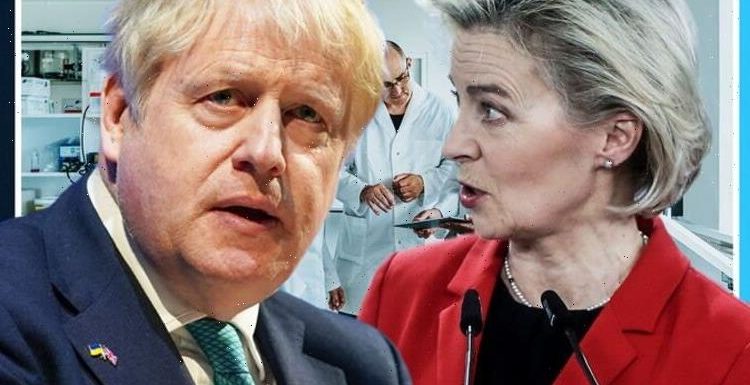
Alok Sharma: North sea gas extraction won't solve energy crisis
We use your sign-up to provide content in ways you’ve consented to and to improve our understanding of you. This may include adverts from us and 3rd parties based on our understanding. You can unsubscribe at any time. More info
Launched last year as the successor to the Horizon 2020 programme, Horizon Europe is a seven-year initiative to provide funding for scientific research and innovation. Back in late 2020, alongside signing the Trade and Cooperation Agreement, the UK and the EU reached an agreement in principle that the UK would associate with Horizon Europe after Brexit.
However, this arrangement has yet to be finalised, more than a year later, particularly due to disputes over Brexit.
The move will cost the UK £15billion over seven years and will allow UK researchers to access the huge £80billion pool of funding and collaborate with European partners
Responding to the House of Lords Science and Technology Committee, UK Science Minsiter George Freeman laid out a plan to fund UK researchers should the UK be permanently barred from Horizon Europe.
He said: “We’ve been very clear that we can’t a situation where uncertainty of being blocked damages UK science and research today.


“That’s why I’ve launched the first guarantee for funding- a sort of in flight applications that have been through the first process we set up in December to guarantee funding.
“We’ve just extended that to the end of the year, to give those teams who would be working on Horizon applications, the knowledge that they won’t be left hanging off a cliff- we will fund them.”
However, he then stressed about the importance of a Plan B for what the UK must do if they aren’t able to join the project.
He stated that the UK Government “a lot of time” between October through December listening to the UK scientific community to understand what is valuable to them about Horizon Europe.

He continued: “A very clear message that the fellowships are hugely valued.
“Secondly the familiarity across Europe of terms when you speak to researchers across universities who say ‘oh it’s a Horizon project, we know how that works.’
“The Plan B is to take what is known and loved by the research community today and make sure that’s there.”
Mr Freeman laid out his plan into three distinct pillars.
He said: “Firstly the talent, I’ve suggested that if we have to do it our own we put more into those talent pillars than traditionally we’ve done and we make them slightly longer term and base them on some of our academy fellowships.
DON’T MISS:
Putin bowel cancer speculation fuelled by ‘Moon face’ fears [ANALYSIS]
UK to launch first power station in SPACE [REPORT]
Germany blocks West from scuppering Putin’s energy ties [INSIGHT]


“Secondly, the industrial pillar, where I would argue that the industrial involvement of UK companies has been quite low.
“I think if we frame those around industrial challenges, we could get more money in from industries.
“The innovation pillar where again actually UK entrepreneurial and VC investment has been quite low because its an academic program.
“I think we can do that we do that better and get more engagement.”
He then continued to with “three new pillars” that would set the UK’s plan B apart, which would focus on the space industry, multilateral and bilateral collaboration outside the EU, and a “much bigger commitment to global challenges.”
Source: Read Full Article